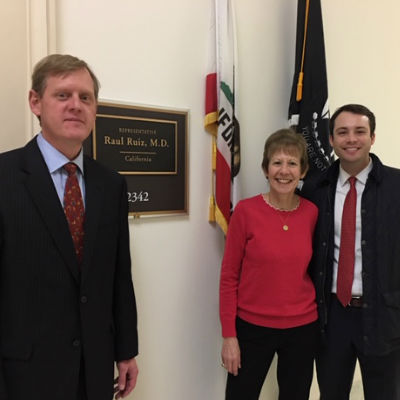
From left, Wade Delk of the American Society for Pain Management Nursing; Steinberg; and Elliott Warren, of the Medical Device Manufacturers Association.
As 2019 comes to a close, advocates are making a final push for Congress to hold a hearing on the Pain Management Best Practices Report, a series of outstanding recommendations for improving pain care nationally.
“If even half of the recommendations in this report were implemented, it would likely change the lives of millions of Americans who suffer with chronic pain,” says Cindy Steinberg, National Director of Policy and Advocacy, who served on the task force that created the report.
More than 150 organizations endorsed the final report. The American Medical Association even called the recommendations “a roadmap for future policy.”
But these changes will only happen if Congress takes action. The first step is holding a hearing to educate policymakers, the media, and ordinary Americans on the scope of the problem and what needs to be done to fix it.
We’re fighting to move pain care forward
A small group of patients, providers, and industry stakeholders is working hard to get a Congressional hearing in either the Senate Health, Education, Labor and Pensions (HELP) Committee, or the House Energy and Commerce Committee.
Over the past few months, Steinberg and other advocates have traveled to D.C. to talk about the report with members of these two key committees. They also collaborated to draft a group letter to both committees, urging that a hearing be scheduled, which has been signed by more than 25 groups so far.
We need your help
There are three ways you can help us get the hearing the pain community deserves:
1) Email your Congressperson. This is a general letter that can be sent to any Congressperson, whether or not they are on one of the two committees.
2) If your Congressperson sits on one of the key committees, give their office a call. We have talking points and direct numbers. You’ll likely speak to an aide, and that’s fine. They’ll report your comments to the legislator. (Entering your zip code through the link below will determine if you’re eligible to participate, based on whether your Congressperson is on either committee.)
3) Speak out on social media. We encourage you to spread the word about the report and these action campaigns–the more people participate, the more likely we are to get attention!
To learn more about the report, visit our toolkit.
